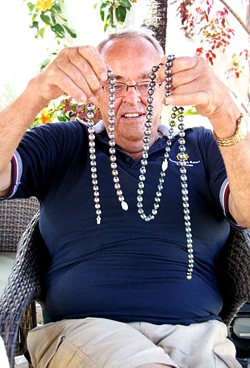How To Live In The Cook Islands
The Cook Islands are no cattle ranch. But that didn't stop born- and-bred rancher Rondo Perkins from investing in a hotel there in 2000. He soon realized a home on an island beats a home on the range and moved to the South Pacific paradise three years ago. Now, more than 5,000 miles from his cattle ranch in Chesterfield, Idaho, 68-year-old Rondo uses his no-nonsense cowboy sensibilities to run both a posh resort on Rarotonga and a black-pearl business on the side. We found out which is easier to deal with: hotel guests or cows.
How did you decide to move to such an under-the-radar spot like Rarotonga in the first place? A close family member found this property, the Crown Beach Resort, and offered me the opportunity to invest. I knew nothing about the Cook Islands, but I met with her and a group of investors. Something seemed a bit fishy, but she said it was the opportunity of a lifetime and that it would only cost me a relatively small sum. I trusted her, came over to see for myself and put the money down. Four weeks later, the bank came knocking, saying I owed even more money. But I paid the rest of it off and ended up living in this beautiful place, so it all worked out in the end.
Besides the initial struggle with the business, was it hard adjusting to life in the tropics? At first, maybe. If you're planning something, you better look ahead several weeks. If you need something that's not on the island, it takes three or four weeks to get it from New Zealand. Most things are available at a high price. I like living here very much, though: The people are friendly, the weather is good 99 percent of the time and overall, I just feel better in Rarotonga. Life here is kind of what I expected, only easier and more enjoyable.
Do you think that you'll stick around indefinitely? I would like to, but my wife, Julie, likes to be at home back in the U.S. with all the kids and grandkids. You could bury me here and I'd be happy. She goes back a couple of months a year to spend time with the family. I only go back a week here and there for the fall & spring harvest and occasionally Christmas, and even that's a stretch. Plane tickets are just too pricey. I miss the kids, the animals and my wife when she's not here. But the resort needs my help more than the ranch. All I need to do on the ranch is make sure they plant the crops right and get the water started.
So is running a resort harder than running a ranch? Running a resort actually proves more challenging at times. You get these guests who give you hell, but you give them a bottle of wine and can usually please them. But sometimes you just can't. As a cowboy, if you've got an old cow that gets in the way, always tearing fences out, doing things she's not supposed to, you just send her to the butcher! At the end of the day, though, people come to Rarotonga and it's my goal to make sure they have the best time they've ever had in their lives.
And you're now importing your beef to the Cook Islands as well? We started that in the spring, bringing it over to the island via Air New Zealand. We don't like the New Zealand beef — the damn stuff 's tough and the quality's terrible. That will be a drawing point to our Oceans restaurant: certified-organic beef.
On the side, you have yet another business there: procuring black pearls and then selling them. So how did that endeavor materialize? I'm like a crow; I like shiny things! It's something I learned when I got over here. Stringing pearls is actually quite easy — if you have the patience. It's a whole lot of trial and error. I was a student of the School of Hard Knocks; you get beat a couple of times and you learn. The very first necklace I ever made was a beautiful peacock-green one I sold for $3,500. I found out later it was worth close to $15,000. I had no idea what they were worth; I just thought that was a pretty good deal. Now I sell my pearls in a shop in the resort lobby. The pearls all come from the northern isle of Manihiki atoll , where all the farms are located. The pearl farmers come down to Rarotonga and visit all the shops, showing and selling their pearls.
What about the resort itself? Have you had to do much renovation? We bought out the other investors just before Christmas in 2004. Then on Feb. 9, 2005, a cyclone wiped out the whole place. It was really a blessing in disguise, we built it back the way it should have originally been built. Insurance covered some, we put in a bit more money and later, in 2007, we added even more villas to do justice to the place.
So you're a very busy man. What do you like to do on your days off? I don't take days off. I enjoy what I do. If you're having fun, why would you need time off?
Facts of Life
- Climate: Tropical
- Population of Cook Islands: 20,000
- Population of Rarotonga: 14,000
- House starting price: $335,000 for a two-bedroom home on the beach
- Travel from U.S.: Fly on several carriers to Auckland, New Zealand, then to Rarotonga
- Hospital: Rarotonga Hospital
- Price of local beer: $4 for a Vailima at Trader Jack's Bar & Grill
- Languages: Maori and English
- Ease of immigration: Medium
- Ease of buying a home: Difficult
- Website: cookislands.travel
